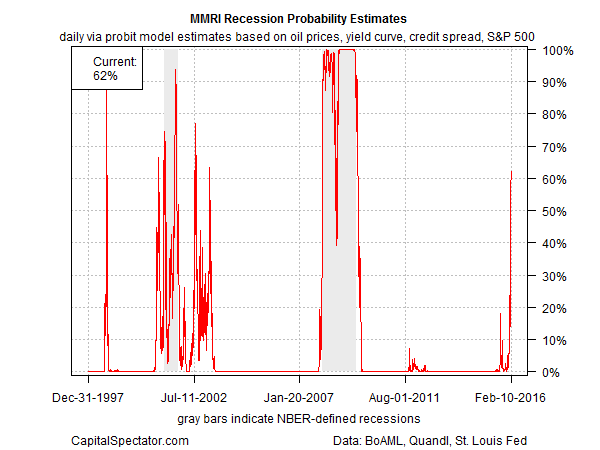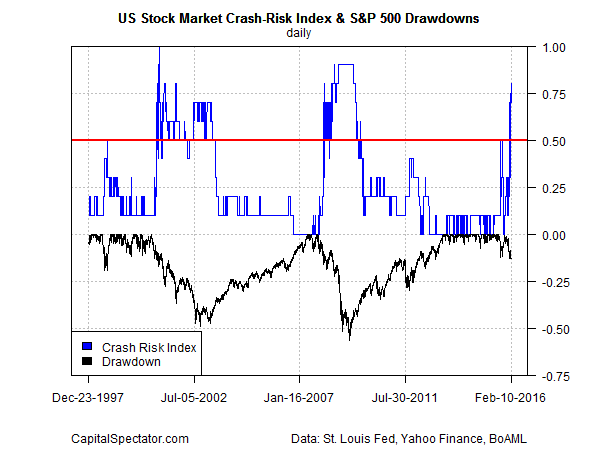Fed Chair Janet Yellen yesterday said that the recent weakness in financial markets may be a warning sign for the US economy. “Financial conditions in the United States have recently become less supportive of growth,” she advised in testimony before the House Financial Services Committee on Wednesday. “These developments, if they prove persistent, could weigh on the outlook for economic activity.” Yellen’s concern is well founded in the current climate. In fact, looking at the latest market numbers through yesterday (Feb. 11) paints a grim picture.
Let’s start with the Macro-Markets Risk Index (MMRI), which is now predicting a US recession. Analyzing the raw data for this markets-based measure of the business cycle through a probit-model lens translates into a 62% probability that an NBER-defined recession has started. (For details about MMRI’s construction, see this post.) In other words, for the first time since the Great Recession was underway in 2008-2009, MMRI’s recession-probability estimates have moved above the 50% tipping point.

In another dark shift, the US stock market’s technical profile has deteriorated sharply, based on the Crash Risk Index (CRI), which aggregates signals from ten models of the market’s trending behavior. The deterioration isn’t all that surprising at this late date, given the recent warnings that CRI has been dispensing in recent months (see here and here, for instance). The difference now is that the last several days have delivered the highest risk readings since the last recession. For the past four trading days, CRI has jumped to 0.7-0.8 levels—well above the 0.5 tipping point. The current reading settled at 0.7 as of yesterday (Feb 10).

The one caveat is that the hard economic data has yet to formally signal that a recession has started. A market-based reading of the business cycle, by contrast, now begs to differ in no uncertain terms. The crucial question is whether the market signal is wrong? That’s possible—indeed, history reminds that bear markets don’t always accompany economic recessions.
The recent profile of the US economic trend, based on a diversified mix of indicators, still shows forward momentum, as discussed late last month. Meanwhile, the Atlanta Fed’s GDPNow model is currently projecting that first-quarter GDP will rebound to 2.5% (seasonally adjusted annual rate) after the stall-speed gain of 0.7% in last year’s fourth quarter.
Mr. Market, however, is pricing in a considerably weaker future for the macro trend—the weakest, in fact, since the last recession, based on the crowd’s reckoning via real-time estimates. The only mystery is whether the hard numbers will corroborate the market’s dark view? The best guess at the moment: It’s going to be close call.
